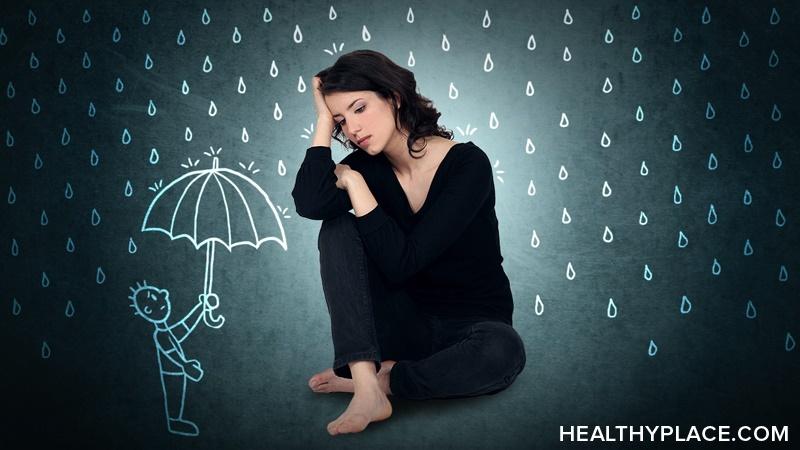If You Know Someone Who's Depressed
 How To Help Someone Who's Depressed
How To Help Someone Who's Depressed
I've gotten lots of questions from friends and family of depression patients, as to how to handle it. This page assumes that the depressed person has been diagnosed and is in treatment.
Main Problems for Friends and Family
Let me start by saying that I, for one, appreciate your wishing to understand someone else's depression. I commend you for taking an interest in a very difficult subject and for wishing to help. In an indirect way, you're a victim of depression too because this illness impinges on everyone around the people who have it.
Pardon my bluntness, but there are a few things you really need to know, before you get too far into this subject.
-
You cannot cure someone else's clinical depression. It is not just sadness which can be waved off with a few kind words. It goes far deeper than that. If you are going into this with the heroic notion that you can somehow "fix" it for your friend, spouse or relative, then you need to disavow it immediately. Operating on this assumption will only frustrate you and does no one any good.
-
There are ups and downs in depression recovery. It is neither swift, nor steady. Your friend or relative is going to go on the decline, now and then. Don't think it's because you are failing them or they are not trying hard enough. The "roller-coaster" effect is just a part and parcel of depression.
-
Please don't tell a depression patient that "you understand." Unless you, yourself, have experienced clinical depression, you don't. And your friend, spouse or relative knows it. It's not a bad thing; since understanding depression means having it. I'd rather that no one, anywhere, understood it. The point here is to be honest with your friend or relative and don't profess things that aren't so. Sincerity will help him or her a great deal; it will engender trust, which every depression patient has a problem with, at one time or another.
-
No one wants to make your life miserable by being depressed. Try not to view someone else's depression as your own affliction. Rather, be grateful that you don't have clinical depression and try to realize what the other person is going through. Don't take the things your friend, spouse or relative says/does, personally. They aren't meant that way.
-
Recovery from depression is not just a matter of taking anti-depressant medication and going to therapy. Both the depression and recovery from it can totally change a person's life. Treatment involves a lot of fundamental changes in a person. At times, you'll wonder if it's the same person you've known for so long. Believe me, it is--the depression probably hid the "real person" from your view, up to the point that he or she was diagnosed and began treatment.
-
At times, it may seem that the person is actually pushing you away. This is very likely true. Most depression patients believe that they unduly affect those around them and will do anything to prevent that from happening. Thus, they isolate themselves from others. This kind of self-sabotage is actually a symptom of the illness itself. Don't let it overcome your relationship. Try to understand that this is often involuntary and irrational, and act accordingly.
How To Help Someone Who's Depressed
For Family and Friends of Depression Patients
What To Say or Do
I cannot tell you precisely what is best for your friend, spouse or relative. I can only give you some guidelines. The rest is up to you.
-
Don't ask very general questions; you won't get a meaningful answer. As an example: Rather than asking "How are you?" ask "How are you today compared to yesterday?" or something of this kind. Make the question open-ended, so the person can say what he or she wants, but provide something specific for them to talk about.
-
Try to get the person out. He or she will want to isolate themselves--hibernate, even--but this is exactly what should not happen. Take walks, go shopping, go to a movie, whatever you have to, to get the person out of the environment they are trying to take shelter in. You may get some resistance, and even complaints; be persistent but not unreasonable.
-
Don't be afraid to let your spouse, relative or friend talk about whatever they want to. Even if they mention self-injury, or they are suicidal, you are not endangering them by listening. Actually, you are helping to protect them from those things; talking helps them deal with these feelings.
-
Keep an eye out for any changes in behavior. These can include appetite, sleep habits, drinking or drug abuse, anything at all. Any major changes may be a sign of trouble.
-
Little things go a long way for someone with clinical depression. Small gifts and favors seem much bigger to them than to you. Don't be afraid to (for example) leave the person a short note with a smiley face on it. Even if it seems silly or hokey, small considerations will help.
-
There are a couple of web pages which speak to this issue better than I can. You can click the links below.
What Depression Is Not
Understanding Depression
Non-depressed people have a difficult time understanding depression; which is completely understandable. I've discussed these things elsewhere, but I think this bears repeating here. Depression is not a weakness, character flaw, personality trait, or anything of that kind. It's not God's punishment for past sins. It's not karma catching up with something the person did in a past life. It's not someone just being too sensitive. It's not laziness or immaturity. No one does anything to deserve it. And you did nothing to cause someone in your life to become clinically depressed.
Depression is also not just the emotion of sadness. In fact, many depression patients experience numbness, or no emotion, rather than sadness. It is called a "mood disorder," but this is a misnomer, in that it can go way beyond someone's mood. Depression can totally disrupt someone's thinking, in every way.
Depression is also not an excuse. Having this illness doesn't absolve anyone of responsibility for themselves. Don't make the mistake of letting a depression patient "off the hook" because of his or her illness. Point out any transgressions and explain what went wrong, and make sure the person understands it. However, getting angry or vindictive do no good, either. Keep criticism constructive. And stick by your friend or relative; you will find that it pays off in the end.
Go here for a more in-depth look at depression and supporting a depressed person.
Accepting Depression In Someone Else
Just as any depression patient must learn to accept his or her illness, and work on overcoming it, so you must accept that they have a mood disorder. Since recovering is really a matter of work on the patient's part, it's impossible to start doing this work until one accepts that one must do it. By the same token, you will find it impossible to deal with someone else's depression, unless you accept that he or she has an illness--a very real one.
From what I've seen, this is one of the hardest things for friends and family to do. I will not kid you into thinking that this is easy. It's not. Accepting an illness in someone else, that you don't understand and never will (hopefully), is not a simple or trivial matter. Above all, don't blame yourself for it. No one can "make" another person depressed, so don't fall into the trap of thinking that you caused it.
For Caregivers of Depression Patients
This is just as important as anything else! You offer nothing to someone else if you're stressed out. If you need to, take some time away from the depressed person. It will give you a better perspective on things and unravel frustrations and tensions. Just make sure that your friend or relative knows that you're still committed to him or her, anyway. You can even tell him/her that you're taking "time out" for yourself, so you can better help. (It's true.)
next: Medications And Depression
~ back to Living with Depression homepage
~ depression library articles
~ all articles on depression
APA Reference
Staff, H.
(2008, December 24). If You Know Someone Who's Depressed, HealthyPlace. Retrieved
on 2026, March 1 from https://www.healthyplace.com/depression/articles/if-you-know-someone-whos-depressed



